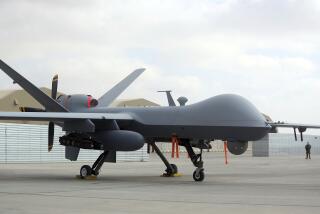U.S., Allies May Impose ‘No-Fly’ Zone in Bosnia : Balkans: Purpose would be to neutralize Serbia’s air supremacy in ethnic war. Plan is to be discussed at U.N.
- Share via
WASHINGTON — The United States and its allies are seriously considering imposing a “no-fly” zone over Bosnia-Herzegovina to neutralize Serbia’s air supremacy in the bloody ethnic warfare over the ruins of Yugoslavia, a senior Bush Administration official said Friday.
Speaking at a meeting of the Overseas Writers Assn., the official said Washington was conferring with Britain, France and other allies over the enforcement of such a ban, presumably by shooting down any Serbian aircraft that challenged it.
“It quite obviously could prevent the use of Serbian aircraft in support of Bosnian Serb ground forces,” said the official, who declined to be identified by name.
Serbia and its Bosnian Serb allies, using about 50 warplanes left behind when the Yugoslav air force withdrew from the republic, are the only combatants in Bosnia with air power.
The official added that the no-fly zone and the allied air patrols required to enforce it might cause combatants in the Yugoslav fighting to rethink their positions. But it also would bring the United States closer to the Yugoslav quagmire that President Bush and his aides are determined to avoid.
In New York, the United States and other members of the U.N. Security Council began consultations Friday about Secretary General Boutros Boutros-Ghali’s proposal to more than double the size of the U.N. military presence in the former Yugoslavia to provide more effective protection for relief convoys to Bosnia. The U.S. official said the no-fly proposal would be discussed in the same meetings.
At last month’s London conference on Yugoslavia, leaders of all the country’s rival ethnic groups signed a declaration agreeing to ban military flights over Bosnia. But the measure contained no enforcement provisions, and Serbian forces have ignored it.
The U.S. official also said an effective no-fly zone would stop Serbian warplanes from endangering U.N. relief flights. But he said that even if last week’s crash of an Italian cargo plane was the result of hostile fire, as some eyewitnesses alleged, a no-fly zone could not have prevented it, since a ground-to-air missile is thought to have been involved.
“This is not the silver bullet that we have either been loath to fire or have just discovered,” the official said.
State Department spokesman Richard Boucher said Serbian warplanes have been “flying in very close proximity to the humanitarian flights (which) presents a serious threat to the safety of United Nations flights.” He said the United States has demanded an end to the practice, which he called “shadowing.”
Boucher said that Milan Panic, prime minister of the rump Yugoslav federation made up of Serbia and its tiny ally Montenegro, and Radovan Karadzic, leader of the Bosnian Serbs, have agreed that the shadowing is “an unacceptable practice, and both have promised to do their utmost to halt these operations.” But he made it clear that the practice has not yet ended.
A Croatian military official said Serbian warplanes were shadowing U.N. flights to confuse antiaircraft gunners on the ground, the Associated Press reported from Zagreb.
Late last month, Serbian aircraft were detected “flying in a radar mask” of U.N. flights ferrying food and medicine from Zagreb to Sarajevo, said Col. Milan Macek, chief of staff of the Croatian air force.
In Belgrade, Panic pledged Friday to take new steps to curb the flow of arms into Bosnia. The prime minister issued the promise after meeting with Cyrus R. Vance and Lord Owen, the chairmen of a joint U.N.-European Community peace committee.
In a communique, Vance and Owen also said that agreement in principle had been reached on putting international observers at military airfields but that further consultations with the United Nations and affected governments were needed before it could be finalized.
Panic also agreed to reopen the main highway between Zagreb and Belgrade next week. It was closed a year ago after Serbian-led federal forces intervened in Croatia after the latter’s secession from the federation, the British news agency Reuters reported.
The communique committed Yugoslavia to take “all practical steps” to end a siege of Sarajevo and to reverse Serbian expulsions of Muslims and Croats from most of Bosnia.
Serbian President Slobodan Milosevic discussed the measures with Owen and Vance but did not sign the communique.
Vance told a news conference that the agreement “was not submitted to Mr. Milosevic and so it does not necessarily carry his approval.”
In the past, Panic has promised frequent steps to end the fighting, but he has not been able to follow through with any of them. Although the situation is far from clear-cut, Milosevic--not Panic or his boss, Yugoslav President Dobrica Kosic--is widely believed to hold the real power in what remains of Yugoslavia.
In Sarajevo, the director of Bosnia’s Health Ministry, Dr. Arij Smajkic, issued new figures showing a sharp rise in casualties from the war. His report said that 10,503 people have been killed and 44,955 seriously wounded in Bosnia-Herzegovina since the fighting began in April.
Central Sarajevo was relatively quiet Friday, but clashes raged in the Bosnian capital’s western suburbs near the airport.
More to Read
Sign up for Essential California
The most important California stories and recommendations in your inbox every morning.
You may occasionally receive promotional content from the Los Angeles Times.










